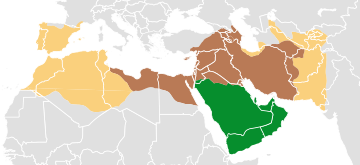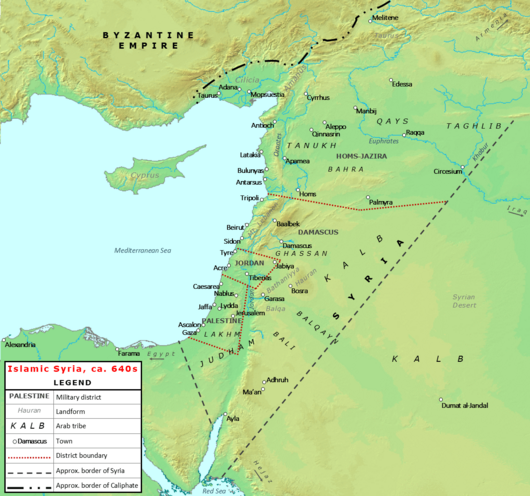Mu'awiya I facts for kids
Quick facts for kids Mu'awiya I
معاوية |
|||||
|---|---|---|---|---|---|
|
|||||
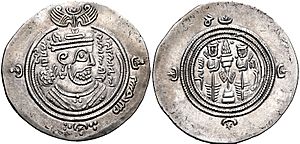
|
|||||
| 1st Caliph of the Umayyad Caliphate | |||||
| Reign | January 661 – April 680 | ||||
| Predecessor |
|
||||
| Successor | Yazid I | ||||
| Governor of Syria | |||||
| In Office | 639–661 | ||||
| Predecessor | Yazid ibn Abi Sufyan | ||||
| Successor | Post discontinued | ||||
| Born | c. 597–605 Mecca, Hejaz, Arabia |
||||
| Died | April 680 (aged c. 75–83) Damascus, Umayyad Caliphate |
||||
| Burial | Bab al-Saghir, Damascus | ||||
| Spouse |
|
||||
| Issue |
|
||||
|
|||||
| House | Sufyanid | ||||
| Dynasty | Umayyad | ||||
| Father | Abu Sufyan ibn Harb | ||||
| Mother | Hind bint Utba | ||||
| Religion | Islam | ||||
Mu'awiya I (Arabic: معاوية بن أبي سفيان, romanized: Muʿāwiya ibn Abī Sufyān; born around 597, 603 or 605 – died April 680) was a very important leader in early Islamic history. He founded and became the first caliph (leader) of the Umayyad Caliphate. He ruled from 661 until his death.
Mu'awiya became caliph less than 30 years after the Islamic prophet Muhammad died. He followed the four Rashidun ('rightly-guided') caliphs. Unlike them, who were close friends of Muhammad, Mu'awiya became a follower later on.
Mu'awiya and his father, Abu Sufyan ibn Harb, were against Muhammad at first. They changed their minds when Muhammad captured Mecca in 630. After that, Mu'awiya became one of Muhammad's scribes (writers).
He rose through the ranks, becoming governor of Syria during the rule of Caliph Uthman. Mu'awiya built strong ties with local tribes and developed Syria's defenses. He also led military efforts against the Byzantine Empire, including the first Muslim naval battles.
After Uthman was killed in 656, Mu'awiya sought to avenge his death. He opposed Ali, who became the next caliph. This led to a major conflict known as the First Muslim Civil War. Their armies fought to a standstill at the Battle of Siffin in 657.
Later, Mu'awiya was recognized as caliph by his supporters in Syria and his ally Amr ibn al-As, who took Egypt from Ali's control. After Ali was killed in 661, Mu'awiya convinced Ali's son Hasan to step down. This made Mu'awiya the recognized leader across the entire Caliphate.
As caliph, Mu'awiya relied on loyal Syrian Arab tribes and the existing Christian government workers. He created new government departments for things like mail and official letters. He was also the first caliph whose name appeared on coins. He continued fighting the Byzantines with almost yearly attacks. He also launched the Muslim conquest of Ifriqiya (central North Africa) and resumed conquests in the eastern lands.
Mu'awiya made his own son, Yazid I, his successor. This was a new idea in Islamic politics. Some important Muslim leaders, like Ali's son Husayn, disagreed with this. Their opposition led to another big conflict after Mu'awiya's death. Many people admired Mu'awiya, but some criticized him for not being as fair or religious as the earlier caliphs. They also felt he turned the caliphate into a kingship.
Sunni Muslims respect Mu'awiya as a companion of Muhammad and a scribe who wrote down parts of the Qur'an. However, Shia Islam views him negatively because he opposed Ali and is accused of poisoning Hasan.
Contents
Mu'awiya's Early Life and Family
Mu'awiya's exact birth year is not certain, but it was around 597, 603, or 605. His father, Abu Sufyan ibn Harb, was a well-known merchant from Mecca. He led trade trips to Syria. Abu Sufyan became a leader of the Banu Abd Shams clan, part of the powerful Quraysh tribe in Mecca. This tribe was initially against the Islamic prophet Muhammad.
Mu'awiya and Muhammad were distantly related through a shared ancestor. Mu'awiya's mother, Hind bint Utba, was also from the Banu Abd Shams clan.
In 624, Mu'awiya's older brother Hanzala and their grandfather were killed in the Battle of Badr against the Muslims. His father, Abu Sufyan, then led the Meccans to victory at the Battle of Uhud in 625. However, Abu Sufyan lost his leadership after a failed siege of Muhammad in Medina in 627.
In 629, Muhammad married Mu'awiya's widowed sister, Umm Habiba. This marriage may have helped reduce Abu Sufyan's dislike for Muhammad. When Muhammad captured Mecca in 630, Mu'awiya, his father, and his older brother Yazid all became Muslims. Some stories say Mu'awiya had secretly become a Muslim earlier.
By 632, Muslim rule covered all of Arabia. Medina became the center of the Muslim government. To bring the Quraysh tribe closer, Muhammad made Mu'awiya one of his kātibs (scribes). Mu'awiya was one of only 17 people in the Quraysh who could read and write at that time.
Mu'awiya's Time as Governor of Syria
Starting His Military and Government Career
After Muhammad died in 632, Abu Bakr became the first caliph. He and the next three caliphs (Umar, Uthman, and Ali) are called the Rashidun or 'rightly-guided' caliphs. Abu Bakr needed support for the new Muslim community. He turned to powerful families like Mu'awiya's.
Mu'awiya's brother Yazid was sent as a commander in the Muslim conquest of Byzantine Syria around 634. Mu'awiya was appointed as a deputy commander under Yazid. This gave Mu'awiya's family an important role in conquering Syria.
Caliph Umar (ruled 634–644) appointed Abu Ubayda ibn al-Jarrah as the main commander in Syria. Mu'awiya was with the Arab troops who entered Jerusalem with Umar in 637. After this, Mu'awiya and Yazid were sent to conquer coastal towns like Sidon and Beirut.
When Abu Ubayda died in 639, Umar divided the command of Syria. Yazid became governor of Damascus, Jordan, and Palestine. When Yazid also died later that year, Umar made Mu'awiya the military and financial governor of Damascus. In 640 or 641, Mu'awiya captured Caesarea, completing the Muslim conquest of Palestine. He also led attacks into Byzantine lands.
When Caliph Uthman (ruled 644–656) took power, Mu'awiya's governorship grew to include Palestine. Later, Uthman added the Homs-Jazira district to Mu'awiya's control. This greatly increased the number of soldiers he commanded.
Building Power in Syria
During Uthman's rule, Mu'awiya made an alliance with the Banu Kalb tribe. This tribe was very powerful in the Syrian desert. They had a lot of military experience and were used to following orders. To make his position in Syria stronger, Mu'awiya married Maysun, the daughter of the Kalb's leader, around 650.
Mu'awiya needed local support because a plague had greatly reduced the number of Muslim troops in Syria. He allowed many Christian tribesmen and farmers to join his army. To pay his troops, Mu'awiya asked Uthman for control of the rich Byzantine crown lands in Syria. These lands had been set aside for the Muslim army.
Many Greek Christians left Syrian cities after the Muslim conquest. Mu'awiya rebuilt and put soldiers in coastal cities like Antioch and Tripoli. He also settled Jewish people in Tripoli and Persians in other cities. He even settled some nomadic Arab tribes in areas north of the Euphrates river.
Mu'awiya started the first Arab naval campaigns in the eastern Mediterranean Sea. He used the harbors of Tripoli, Beirut, and Tyre. Caliph Umar had said no to a naval attack on Cyprus. But Uthman allowed Mu'awiya to start the campaign in 647. Mu'awiya believed the Byzantine-held island was a threat to Syria's coast.
The exact year of the Cyprus raid is unclear, but it was between 647 and 650. Mu'awiya may have led the raid himself. The Cypriots were forced to pay a tribute to the Caliphate. Mu'awiya set up a military base and a mosque on the island. Cyprus became a place for both Arabs and Byzantines to launch attacks.
Mu'awiya's navy also attacked Crete and Rhodes in 653. In 654 or 655, a combined Arab fleet from Egypt and Syria defeated a Byzantine fleet at the Battle of the Masts. This victory opened the way for an attack on Constantinople, but it was not successful.
Meanwhile, Mu'awiya also gained control over Armenia. In 653, the Armenian leader submitted to Mu'awiya. In 655, Mu'awiya's commander captured Theodosiopolis, making Arab rule over Armenia stronger.
The First Big Conflict
Mu'awiya's area in Syria was mostly calm during the growing unrest against Caliph Uthman in other parts of the Caliphate. However, Abu Dhar al-Ghifari, who criticized Uthman, was sent to Damascus. He also criticized Mu'awiya's expensive palace, leading Mu'awiya to send him away.
When rebels surrounded Uthman's home in June 656, Uthman asked Mu'awiya for help. Mu'awiya sent an army, but it turned back when news arrived that Uthman had been killed. Ali, Muhammad's cousin and son-in-law, was then recognized as caliph in Medina. Mu'awiya refused to pledge loyalty to Ali.
Soon after becoming caliph, Ali faced opposition from many Quraysh leaders and Muhammad's wife A'isha. This led to the First Fitna, a civil war. Ali defeated his opponents at the Battle of the Camel. With his position in Iraq, Egypt, and Arabia secure, Ali then focused on Mu'awiya. Unlike other governors, Mu'awiya had a strong and loyal power base in Syria. He demanded revenge for Uthman's death and could not be easily replaced. At this point, Mu'awiya was not yet claiming to be caliph himself. His main goal was to keep power in Syria.
Getting Ready for War
Ali's victory made Mu'awiya's position difficult. His territory was between Ali's forces in Iraq and Egypt, and he was still fighting the Byzantines. In 657 or 658, Mu'awiya made a truce with the Byzantine emperor. This allowed him to focus his troops on the coming battle with Ali.
Mu'awiya also made a deal with Amr ibn al-As, the conqueror and former governor of Egypt. Amr was popular with the Arab troops in Egypt. They agreed that Amr would join the fight against Ali. In return, Mu'awiya promised to make Amr Egypt's governor for life if they won.
Mu'awiya also strengthened his support in Syria by making alliances with other important tribes. He used respected leaders to gather support for his side. Demands for war against Ali grew in Mu'awiya's lands. When Ali sent an envoy to Mu'awiya, Mu'awiya responded with a letter that was basically a declaration of war. He refused to recognize Ali as the rightful caliph.
Battle of Siffin and Talks
In June 657, Mu'awiya's and Ali's armies met at Siffin near Raqqa. They fought for days, then had a month-long truce. During the truce, Mu'awiya sent a message to Ali. He demanded that Ali hand over Uthman's killers, step down, and let a council decide who should be caliph. Ali refused.
The main battle began on July 26. Ali's troops pushed towards Mu'awiya's tent. Mu'awiya's best troops fought back, but the next day, two of Mu'awiya's top commanders were killed. The battle reached its peak on July 28. Ali's forces gained the upper hand, and many soldiers died on both sides.
At this point, Mu'awiya's adviser, Amr ibn al-As, suggested a plan. He told Mu'awiya to have his men tie leaves from the Qur'an to their spears. This was a call for the Iraqis to settle the conflict through discussion, not fighting. This action caused disagreement among Ali's soldiers.
Ali's army mostly wanted to agree to talks. Ali accepted the proposal to discuss the matter. He also agreed to remove his title, amir al-mu'minin (commander of the faithful), from the agreement. This made Mu'awiya seem equal to Ali. This decision caused a major split in Ali's army. Many soldiers who opposed the talks left, starting the Kharijite movement.
There were likely two meetings between Mu'awiya's and Ali's representatives. Ali stopped the talks after the first meeting. Mu'awiya's representative argued that Uthman was killed unfairly, which Ali disagreed with. By the time the talks ended, Mu'awiya had become a strong contender for the caliphate.
Becoming Caliph and More Fighting
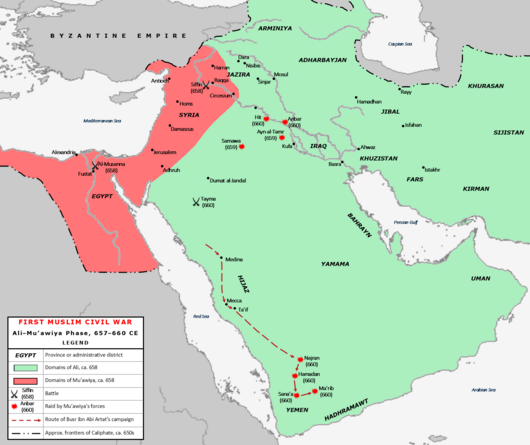
After the talks failed, Amr and the Syrian leaders returned to Damascus. They greeted Mu'awiya as amir al-mu'minin, recognizing him as caliph. In April or May 658, Mu'awiya received pledges of loyalty from the Syrians. Ali responded by stopping communication with Mu'awiya and preparing for war.
In July, Mu'awiya sent an army under Amr to Egypt. Amr's forces defeated Ali's governor, and Egypt's capital was captured. This was a big loss for Ali. Mu'awiya did not attack Ali directly. Instead, he tried to win over tribal leaders in Ali's army with money. He also sent small raiding parties to attack towns on Iraq's western border.
In 659 or 660, Mu'awiya expanded his attacks to the Hejaz (western Arabia, where Mecca and Medina are). He sent forces to collect taxes and pledges of loyalty. These early attempts were not fully successful.
In the summer of 660, Mu'awiya sent a large army to conquer the Hejaz and Yemen. His commander, Busr, was told to scare the people of Medina but not harm them. He was to spare Meccans but kill anyone in Yemen who refused to pledge loyalty. Busr went through Medina, Mecca, and Ta'if without resistance. He gained their recognition for Mu'awiya. In Yemen, Busr killed several leaders and many tribesmen. News of Busr's actions made Ali's troops want to fight Mu'awiya. However, Ali was killed by a Kharijite in January 661, stopping the expedition.
Mu'awiya's Caliphate
Becoming the Caliph
After Ali was killed, Mu'awiya marched his army towards Kufa. Ali's son, Hasan, had been named as his successor there. Mu'awiya managed to bribe Hasan's army commander. He then sent people to talk with Hasan. In exchange for money, Hasan stepped down. Mu'awiya entered Kufa in July or September 661 and was recognized as caliph. This year is often called 'the year of unity' and marks the start of Mu'awiya's rule.
Before or after Ali's death, Mu'awiya received pledges of loyalty in Jerusalem. This happened in late 660 or early 661, and again in July 661. Some sources say Mu'awiya improved a mosque on the Temple Mount in Jerusalem. He received formal pledges of loyalty there. An old Christian record says Mu'awiya received pledges from tribal leaders. He then prayed at important Christian sites in Jerusalem. This record also says Mu'awiya "did not wear a crown like other kings."
Ruling and Government
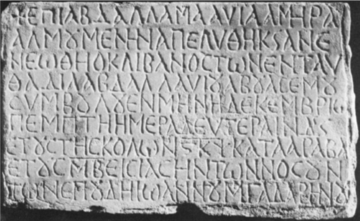
There isn't much detailed information about Mu'awiya's daily rule in Syria. He set up his court in Damascus and moved the caliphate's treasury there. He relied on his Syrian soldiers, about 100,000 men. He paid them more than the Iraqi soldiers. The highest payments went to 2,000 nobles from the Quda'a and Kinda tribes, who were his main supporters. These nobles also had the right to advise him and veto decisions.
Mu'awiya is known for creating new government departments. These included departments for official letters, records, and the postal service. After an assassination attempt in 661, Mu'awiya also created a personal guard and a special area in mosques for the caliph.
Syria kept its old Byzantine government workers, many of whom were Christians. Mu'awiya was tolerant of Syria's Christian majority. They were generally happy with his rule, which was at least as good as under the Byzantines. Mu'awiya tried to mint his own coins, but they were rejected because they didn't have a cross symbol.
An old Greek inscription from 663 found in Syria mentions Mu'awiya. It calls him "God's Servant Mu'awiya, commander of the faithful" and thanks him for fixing Roman-era bath facilities. This shows he wanted to please his Christian subjects. Mu'awiya often spent winters at his palace near the Sea of Galilee. He also ordered the repair of a church in Edessa after an earthquake.
Governing the Provinces
Mu'awiya's main challenge was to unite the Caliphate and control the various tribes that made up his armies. He ruled the provinces indirectly. He appointed governors who had full power over civil and military matters. These governors were supposed to send extra tax money to the caliph. But in reality, most of it stayed in the provinces.
Mu'awiya preferred to bribe his opponents rather than fight them directly. He made agreements with powerful people in the provinces. He built up the power of those who worked with him.
Iraq and the East
Iraq was the most challenging province to control. Mu'awiya appointed al-Mughira ibn Shu'ba to govern Kufa in 661. Al-Mughira was experienced and knew the region well. He kept peace in the city and paid the soldiers on time.
In Basra, Mu'awiya appointed Abd Allah ibn Amir. He restarted military campaigns into eastern lands. However, he couldn't keep order in Basra. So, Mu'awiya replaced him with Ziyad ibn Abihi in 664 or 665. Ziyad had been loyal to Ali for a long time. Mu'awiya controversially adopted Ziyad as his half-brother to secure his loyalty.
After al-Mughira died in 670, Mu'awiya gave Ziyad control over Kufa as well. This made Ziyad the main ruler of the eastern Caliphate. Ziyad solved Iraq's problem of too many people in the army cities. He sent 50,000 Iraqi soldiers and their families to settle in Khurasan. This also strengthened Muslim control in the far eastern province. Ziyad died in 673, and his son Ubayd Allah gradually took over his father's roles.
Egypt
In Egypt, Amr ibn al-As governed almost as an equal partner with Mu'awiya until his death in 664. He was allowed to keep the extra money from the province. Mu'awiya ordered that grain and oil shipments to Medina from Egypt should start again.
After Amr's death, Mu'awiya appointed other governors. In 667, he appointed Maslama ibn Mukhallad al-Ansari, who remained governor for the rest of Mu'awiya's rule. Maslama greatly expanded the city of Fustat and its mosque. He also moved Egypt's main shipyard to Roda Island in 674. This made Fustat more important.
The Arab military presence in Egypt was mainly in Fustat and Alexandria. Mu'awiya sent more troops to Egypt, increasing Fustat's army from 15,000 to 40,000. The troops in Egypt were less rebellious than those in Iraq.
Arabia
Mu'awiya did not give much power to his own Umayyad family members, except in Medina. He limited their influence to Medina, the old capital. The Umayyads in Medina were unhappy about this. Mu'awiya tried to weaken the clan by causing disagreements among them.
Despite moving to Damascus, Mu'awiya loved his homeland of Arabia. He bought land and invested money to develop it for farming. He dug wells and canals, built dams, and created fountains. This led to large grain fields and date palm groves around Mecca.
An early Arabic inscription from Mu'awiya's reign was found at a dam near Ta'if. It credits Mu'awiya for building the dam in 677 or 678. It asks God to give him victory and strength. He is also credited with building another dam near Medina.
Wars with the Byzantine Empire
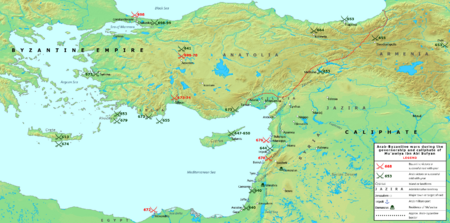
Mu'awiya had more experience fighting the Byzantines than any other caliph. He continued the war against them very actively. The civil war had caused the Arabs to lose control of Armenia. But in 661, Mu'awiya's forces re-invaded the region. The next year, Armenia became a tributary of the Caliphate.
Mu'awiya broke the truce with Byzantium. Almost every year, his Syrian troops attacked the mountainous border region between the two empires. Homs was the main starting point for these attacks. Mu'awiya continued to resettle and strengthen the Syrian port cities. He moved Persian civilians and soldiers into Acre and Tyre. He also settled 5,000 Slavs who had left the Byzantines in Apamea.
The first attack of Mu'awiya's caliphate happened in 662 or 663. His forces heavily defeated a Byzantine army. In the late 660s, Mu'awiya's forces attacked cities in Anatolia. After the Byzantine Emperor Constans II died in 668, Mu'awiya became even more aggressive with naval warfare.
Attacks against the Byzantines were very frequent between 668 and 669. There were many land campaigns and major naval campaigns. The main goal was an assault on Constantinople, the Byzantine capital. Mu'awiya's son Yazid led a campaign against Constantinople in 669. An Arab fleet reached the Sea of Marmara. Yazid and his forces besieged Constantinople in spring 668. However, due to famine and disease, they lifted the siege in late June. The Arabs continued fighting near Constantinople before returning to Syria in late 669.
In 669, Mu'awiya's navy raided as far as Sicily. The next year, the defenses of Alexandria were completed. Some historians believe Mu'awiya's forces captured Rhodes in 672–674 and lived there for seven years. However, other historians doubt this.
Under Emperor Constantine IV, the Byzantines began to fight back. They raided Egypt in 672 or 673. In 673, Mu'awiya's admiral led a large fleet that raided Smyrna and other coastal areas. The Byzantines won a major victory against an Arab army and fleet in 673 or 674.
Some sources say Mu'awiya asked for peace with Constantine IV around 677–679. A 30-year treaty was supposedly made. The Caliphate would pay a yearly tribute and withdraw troops from Byzantine coastal bases. However, other Byzantine and Islamic sources do not mention this treaty.
Even though the Muslims didn't gain permanent land in Anatolia, the frequent raids helped Mu'awiya's Syrian troops. They gained war spoils and tribute, which kept them loyal. It also improved their fighting skills and prevented the Byzantines from launching major attacks on Syria.
Conquering Central North Africa
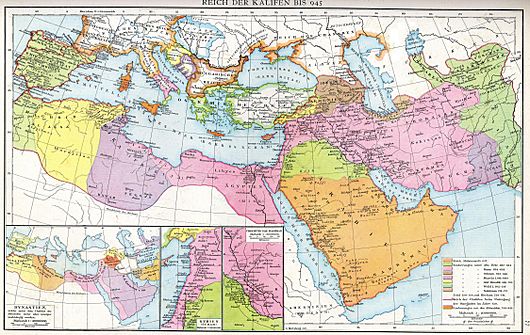
The Arabs had not moved much beyond Cyrenaica since the 640s. But during Mu'awiya's rule, attacks against Byzantine North Africa began again. In 665 or 666, an army raided southern Byzantine Africa and captured Bizerte temporarily. The next year, Mu'awiya's forces raided the island of Djerba.
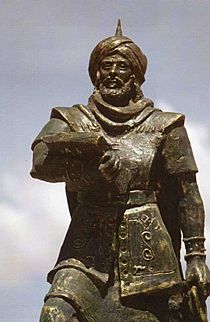
In 662 or 667, Uqba ibn Nafi, an Arab commander, strengthened Muslim influence in the Fezzan region. He captured the Zawila oasis. The Byzantine emperor's focus shifted away from Africa due to a rebellion.
In 670, Mu'awiya appointed Uqba as deputy governor over the North African lands west of Egypt. Uqba led 10,000 soldiers. His army, joined by Muslim Berber tribesmen, conquered Ghadamis and Gafsa. He established a permanent Arab military town called Kairouan. This town was far enough from Carthage (which was still under Byzantine control) to be a safe base for future attacks. It also helped convert Berber tribes to Islam.
Mu'awiya removed Uqba from his position in 673. He may have been worried that Uqba would become too powerful. The new Arab province, Ifriqiya (modern-day Tunisia), remained under the governor of Egypt. A treaty between the Arabs and Byzantines in 678 gave Byzacena to the Caliphate. After Mu'awiya's death, his successor Yazid reappointed Uqba. However, a Byzantine-Berber alliance later ended Arab control over Ifriqiya. It was not reestablished until the rule of Caliph Abd al-Malik ibn Marwan (ruled 685–705).
Naming Yazid as Successor
Mu'awiya did something new in Islamic politics: he named his own son, Yazid, as his successor. He likely planned this for a long time. Some stories say he had his governor in Homs, Abd al-Rahman ibn Khalid, poisoned in 666. This was to remove him as a possible rival to Yazid. Abd al-Rahman was popular with the Syrian Arabs, who saw him as a good choice for caliph.
Mu'awiya publicly announced Yazid as his heir later in his rule. The exact timing varies in different historical accounts. Some say he announced it in 675 or 676 and demanded pledges of loyalty for Yazid. Others say delegations from all provinces came to Damascus. Mu'awiya spoke about his rights as ruler and Yazid's good qualities. Most delegates supported Yazid, though some were bribed to agree.
Yazid's connection to the powerful Kalb tribe was very important. The Kalb tribe was the basis of Mu'awiya's rule, and Yazid's succession meant this alliance would continue. Mu'awiya had an older son, Abd Allah, but he chose Yazid, whose mother was Kalbite. Mu'awiya encouraged Yazid to gain support from other tribes in Syria.
In Medina, some of Mu'awiya's relatives and other important figures accepted his decision, though they were not happy about it. Most opponents in Iraq and Arabia were either threatened or bribed into accepting. The main opposition came from Husayn ibn Ali, Abd Allah ibn al-Zubayr, Abd Allah ibn Umar, and Abd al-Rahman ibn Abi Bakr. These were prominent sons of earlier caliphs or companions of Muhammad. Mu'awiya wanted their recognition. Some accounts say Mu'awiya gave orders for certain actions to be taken against them before he died.
Death of Mu'awiya
Mu'awiya died from an illness in Damascus in April or May 680 CE. He was about 80 years old. The exact date of his death varies in different historical records. Yazid was not in Damascus when his father died.
In his last message, Mu'awiya told his family to "Fear God." He said God protects those who fear Him. He was buried near the Bab al-Saghir gate in Damascus. The funeral prayers were led by al-Dahhak ibn Qays. He praised Mu'awiya as the "stick of the Arabs and the blade of the Arabs." He said God used Mu'awiya to end conflict and conquer lands.
Mu'awiya's grave was a place people visited even as late as the 10th century. Some accounts say a mausoleum was built over his grave. It was open to visitors on Mondays and Thursdays.
Mu'awiya's Impact and Legacy
Mu'awiya used the title khalifat Allah ('deputy of God'). This was different from the earlier caliphs' title, which meant 'deputy of the messenger of God'. This new title might have suggested he had both political and religious authority from God. However, Mu'awiya did not force his religious authority on people. Instead, he ruled like a tribal chief, using alliances, his personal skills, and persuasion.
He rarely used his Syrian troops within the Caliphate. He often used money to avoid conflict. Historians describe Mu'awiya as a skilled diplomat. He let things develop naturally and only helped them along when needed. He was also good at finding and using talented people.
One historian, Patricia Crone, believes Mu'awiya's success was due to the tribal makeup of Syria. The Arab tribes there were united under one main group, the Quda'a. This was different from Iraq and Egypt, where many different tribes made it hard for the government to find stable support. Mu'awiya's ability to use Syria's tribal situation prevented the Caliphate from breaking apart during the civil war.
However, Mu'awiya's system of rule was not strong in the long term. It relied on personal relationships and paying people to stay loyal. This meant governors became too powerful and rich. The tribal balance he relied on was also unstable. When Yazid became caliph, he continued his father's way of ruling. But he faced rebellions. Even though he defeated them, the system broke down after he died in 683.
The Umayyads eventually regained control after a long civil war. But it was under new leaders who changed the system. They made the caliph the central authority, moving away from Mu'awiya's indirect rule. Still, the idea of a caliph's son taking over became a permanent feature of many Muslim governments.
Many historians see Mu'awiya's greatest achievement as keeping the Caliphate united. He also continued the Muslim conquests. By building a strong navy, he made the Caliphate the main power in the eastern Mediterranean Sea. He secured control of northeastern Iran and expanded the Caliphate's borders in North Africa.
Some historians criticize Mu'awiya for changing the caliphate into a worldly kingship. They say he used religion for social control and military power. He was the first caliph whose name appeared on coins and documents. These early inscriptions did not clearly mention Islam or Muhammad. This has led some modern historians to question his religious commitment. However, other historians point out that Mu'awiya challenged the Byzantine emperor to worship "the God of our father Abraham," showing his Islamic faith.
Early Historical Views
Most surviving Muslim histories were written in Iraq during the Abbasid era. The people who wrote these histories were often against the Syria-based Umayyads. This is because Syria was favored under Umayyad rule, and Iraq felt like a colony. The Abbasids, who overthrew the Umayyads, also wanted to make the Umayyads look bad to make their own rule seem more legitimate. So, Muslim historical writings are generally anti-Umayyad.
However, even these histories often show Mu'awiya in a somewhat balanced way. They describe him as a successful ruler who used persuasion instead of force. They highlight his quality of hilm, which means mildness, patience, and managing people by understanding their needs. Many stories show his political cleverness and self-control.
The histories show him acting like a traditional tribal chief. He would call meetings of tribal leaders and persuade them with flattery, arguments, and gifts. A famous saying attributed to him is: "I never use my voice if I can use my money, never my whip if I can use my voice, never my sword if I can use my whip; but, if I have to use my sword, I will."
On the other hand, these histories also say he was a ruler who turned the caliphate into a kingship. He was compared to Persian kings, who were known for their worldly splendor and strong rule. This comparison was mainly because he appointed his son Yazid as the next caliph. This was seen as going against the Islamic idea of shura (consultation) and starting a dynasty like the Byzantines and Persians. The civil war after Mu'awiya's death is seen as a direct result of Yazid's appointment. In Islamic tradition, Mu'awiya and the Umayyads are often called malik (king) instead of khalifa (caliph).
Non-Muslim sources from that time generally show Mu'awiya in a good light. A Christian historian called him "first among equals." Another Christian writer from the 690s praised Mu'awiya's rule, saying there was "peace throughout the world."
Muslim Views Today
Unlike the first four caliphs, Mu'awiya is not seen as a "rightly-guided caliph" by Sunni Muslims. They believe he changed the caliphate into a worldly and harsh kingship. His taking power through civil war and making his son Yazid his successor are the main reasons for this view. However, Sunnis still respect him as a companion of Muhammad and someone who wrote down parts of the Qur'an. Some Sunnis believe that even though he made mistakes in his war against Ali, he acted with good intentions.
In Shia Islam, Mu'awiya is strongly disliked. This is because he fought against Ali, whom Shias believe was the true successor of Muhammad. Shias hold him responsible for the deaths of some of Muhammad's companions. They also accuse him of ordering the cursing of Ali and killing Ali's son Hasan. They also blame him for appointing Yazid, who later killed Husayn at Karbala. Shias deny that he was a companion of Muhammad or a scribe of the Qur'an. Many Shias perform a ritual cursing of Mu'awiya.
In the 10th century, as religious differences grew, Mu'awiya became a symbol in arguments between Shias and Sunnis. Some Sunnis strongly supported Mu'awiya. At the same time, Shias were allowed to ritually curse Mu'awiya in mosques.
| Family tree of Mu'awiya I | |||||||||||||||||||||||||||||||||||||||||||||||||||||||||||||||||||||||||||||||||||||||||||||||||||||||||||||||||||||||||||||||||||||||||||||||||||||||||||||||||||||||||||||||||||||||||||||||||||||||||||||||||||||||||||||||||||||||||||||||||||||||||||||||||||||||||||||||||||||||||||||||||||||||||||||||||||||||||||||||||||||||||||||||||||||||||||||||||||||||||||||||||||||||||||||||||||||||||||||||||||||||||||||||||||||||||||||||||||||||||||||||||||||||||||||||||||||||||||||||||||||||||||||||||||||||||||||||||||||||||||||||||||||||||||||||||||||||||||||||||||||||||||||||||||||||||||||||||||||||||||||||||||||||||||||||||||||||||||||||||||||||||||||||||||||||||||||||||||||||||||||||||||||||||||||||||||||||||||||||||||||||||||||||||||||||||||||||||||||||||||||||||||||||||||||||||||||||||||||||||||||||||||||||||||||||||||||||||||||||||||||||||||||||||||||||||||||||||||||||||||||||||||||||||||||||||||||||||||||||||||||||||||||||||||||||||||||||||||||||||||||||||||||||||||||||||||||||||||||||
|---|---|---|---|---|---|---|---|---|---|---|---|---|---|---|---|---|---|---|---|---|---|---|---|---|---|---|---|---|---|---|---|---|---|---|---|---|---|---|---|---|---|---|---|---|---|---|---|---|---|---|---|---|---|---|---|---|---|---|---|---|---|---|---|---|---|---|---|---|---|---|---|---|---|---|---|---|---|---|---|---|---|---|---|---|---|---|---|---|---|---|---|---|---|---|---|---|---|---|---|---|---|---|---|---|---|---|---|---|---|---|---|---|---|---|---|---|---|---|---|---|---|---|---|---|---|---|---|---|---|---|---|---|---|---|---|---|---|---|---|---|---|---|---|---|---|---|---|---|---|---|---|---|---|---|---|---|---|---|---|---|---|---|---|---|---|---|---|---|---|---|---|---|---|---|---|---|---|---|---|---|---|---|---|---|---|---|---|---|---|---|---|---|---|---|---|---|---|---|---|---|---|---|---|---|---|---|---|---|---|---|---|---|---|---|---|---|---|---|---|---|---|---|---|---|---|---|---|---|---|---|---|---|---|---|---|---|---|---|---|---|---|---|---|---|---|---|---|---|---|---|---|---|---|---|---|---|---|---|---|---|---|---|---|---|---|---|---|---|---|---|---|---|---|---|---|---|---|---|---|---|---|---|---|---|---|---|---|---|---|---|---|---|---|---|---|---|---|---|---|---|---|---|---|---|---|---|---|---|---|---|---|---|---|---|---|---|---|---|---|---|---|---|---|---|---|---|---|---|---|---|---|---|---|---|---|---|---|---|---|---|---|---|---|---|---|---|---|---|---|---|---|---|---|---|---|---|---|---|---|---|---|---|---|---|---|---|---|---|---|---|---|---|---|---|---|---|---|---|---|---|---|---|---|---|---|---|---|---|---|---|---|---|---|---|---|---|---|---|---|---|---|---|---|---|---|---|---|---|---|---|---|---|---|---|---|---|---|---|---|---|---|---|---|---|---|---|---|---|---|---|---|---|---|---|---|---|---|---|---|---|---|---|---|---|---|---|---|---|---|---|---|---|---|---|---|---|---|---|---|---|---|---|---|---|---|---|---|---|---|---|---|---|---|---|---|---|---|---|---|---|---|---|---|---|---|---|---|---|---|---|---|---|---|---|---|---|---|---|---|---|---|---|---|---|---|---|---|---|---|---|---|---|---|---|---|---|---|---|---|---|---|---|---|---|---|---|---|---|---|---|---|---|---|---|---|---|---|---|---|---|---|---|---|---|---|---|---|---|---|---|---|---|---|---|---|---|---|---|---|---|---|---|---|---|---|---|---|---|---|---|---|---|---|---|---|---|---|---|---|---|---|---|---|---|---|---|---|---|---|---|---|---|---|---|---|---|---|---|---|---|---|---|---|---|---|---|---|---|---|---|---|---|---|---|---|---|---|---|---|---|---|---|---|---|---|---|---|---|---|---|---|---|---|---|---|---|---|---|---|---|---|---|---|---|---|---|---|---|---|---|---|---|---|---|---|---|---|---|---|---|---|---|---|---|---|---|---|---|---|---|---|---|---|---|---|---|---|---|---|---|---|---|---|---|---|---|---|---|---|---|---|---|---|---|---|---|---|---|---|---|---|---|---|---|---|---|---|---|---|---|---|---|---|---|---|---|---|---|---|---|---|---|---|---|---|---|---|---|---|---|---|---|---|---|---|---|---|---|---|---|---|---|---|---|---|---|---|---|---|---|---|---|---|---|---|---|---|---|---|---|---|---|---|---|---|---|---|---|---|---|---|---|---|---|---|---|---|---|---|---|---|---|---|---|---|---|---|---|---|---|---|---|---|---|---|---|---|---|---|---|---|---|---|---|---|---|---|---|---|---|---|---|---|---|---|---|---|---|---|---|---|---|---|---|---|---|---|---|---|---|---|---|---|---|---|---|---|---|---|---|---|---|---|---|---|---|---|---|---|---|---|---|---|---|---|---|---|---|---|---|---|---|---|---|---|---|---|---|---|---|---|---|---|---|---|---|---|---|---|---|---|---|---|---|---|---|---|---|---|---|---|---|---|---|---|---|---|---|---|---|---|---|---|---|---|---|---|---|---|---|---|---|---|---|---|---|---|---|---|---|---|---|---|---|---|---|---|---|---|---|---|---|---|---|---|---|---|---|---|---|---|---|---|---|---|---|---|---|---|---|---|---|---|---|---|---|---|---|---|---|---|---|---|---|---|---|---|---|---|---|---|---|---|---|---|---|---|---|---|---|---|---|---|---|---|---|---|---|---|---|---|---|---|---|---|---|---|---|---|
Dashed line indicates marriage |
|||||||||||||||||||||||||||||||||||||||||||||||||||||||||||||||||||||||||||||||||||||||||||||||||||||||||||||||||||||||||||||||||||||||||||||||||||||||||||||||||||||||||||||||||||||||||||||||||||||||||||||||||||||||||||||||||||||||||||||||||||||||||||||||||||||||||||||||||||||||||||||||||||||||||||||||||||||||||||||||||||||||||||||||||||||||||||||||||||||||||||||||||||||||||||||||||||||||||||||||||||||||||||||||||||||||||||||||||||||||||||||||||||||||||||||||||||||||||||||||||||||||||||||||||||||||||||||||||||||||||||||||||||||||||||||||||||||||||||||||||||||||||||||||||||||||||||||||||||||||||||||||||||||||||||||||||||||||||||||||||||||||||||||||||||||||||||||||||||||||||||||||||||||||||||||||||||||||||||||||||||||||||||||||||||||||||||||||||||||||||||||||||||||||||||||||||||||||||||||||||||||||||||||||||||||||||||||||||||||||||||||||||||||||||||||||||||||||||||||||||||||||||||||||||||||||||||||||||||||||||||||||||||||||||||||||||||||||||||||||||||||||||||||||||||||||||||||||||||||||
See also
 In Spanish: Muawiya ibn Abi Sufyán para niños
In Spanish: Muawiya ibn Abi Sufyán para niños
 | William Lucy |
 | Charles Hayes |
 | Cleveland Robinson |


